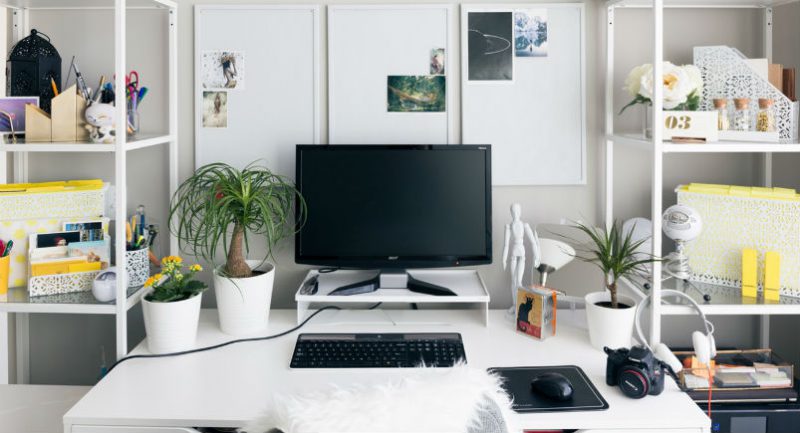An organized workspace is more than just a neat environment—it can have a profound impact on your productivity, mental well-being, and overall success. Whether you’re working from home, in a traditional office, or in a creative studio, maintaining a clutter-free, well-structured workspace offers numerous benefits that can help you perform at your best.
In this article, we’ll explore the key benefits of an organized workspace, focusing on how it can boost efficiency, reduce stress, and enhance your overall work experience.
1. Increased Productivity
One of the most immediate and noticeable benefits of an organized workspace is a significant boost in productivity. A cluttered environment can be distracting and overwhelming, leading to difficulty in focusing on tasks at hand. By creating a clean and well-organized workspace, you minimize distractions and streamline your workflow, making it easier to stay focused and complete tasks more efficiently.
A. Reduced Time Spent Searching for Items
When your workspace is organized, you know exactly where everything is, reducing the time spent searching for files, supplies, or tools. Whether it’s finding the right document on your computer or locating a physical item like a pen or a stapler, an organized space makes everything easily accessible.
- Example: If your desk is cluttered with papers, you may spend several minutes looking for a specific document before you can continue with your task. An organized workspace ensures everything is in its place, saving you valuable time.
B. Streamlined Task Management
Having an organized workspace allows you to prioritize tasks more easily. When your work area is neat, it’s easier to see what needs to be done and in what order, helping you stay on top of deadlines and responsibilities.
- Example: You can keep important tasks front and center, whether it’s a physical to-do list or digital reminders, making it easier to focus on completing tasks without feeling overwhelmed by clutter.
2. Reduced Stress and Mental Clutter
An organized workspace can significantly reduce stress levels by creating a calm and focused environment. Clutter and disorganization can cause anxiety and mental fatigue, as the brain is constantly processing the mess around you. When your workspace is tidy, it allows your brain to focus on the task at hand instead of being distracted by disorganization.
A. Clear Space, Clear Mind
A clutter-free workspace fosters a sense of control and calm. You’re able to focus more on your work and less on the chaos around you. This creates a positive mental environment that promotes clear thinking and decision-making.
- Example: When your desk is tidy, you may feel more relaxed and at ease, leading to better problem-solving and more creative thinking. On the other hand, a messy desk can create mental tension, leading to reduced concentration and motivation.
B. Improved Work-Life Balance
An organized workspace helps separate your work from your personal life, especially for those working remotely. A designated, clutter-free area dedicated to work allows you to focus on professional tasks without distractions, while maintaining boundaries for personal time once you leave the workspace.
- Example: When you finish your workday, a tidy and organized space makes it easier to “close” your workday, helping you mentally disconnect from work and enjoy your personal time.
3. Enhanced Creativity and Problem-Solving
While it may seem like a cluttered environment would foster creativity, studies suggest that an organized workspace actually enhances creative thinking and problem-solving abilities. When your workspace is neat, you’re able to think more clearly, allowing your mind to flow freely and generate new ideas.
A. Fewer Distractions
An organized environment reduces distractions that can interrupt the creative process. With everything in its place, you can focus on exploring new ideas and thinking outside the box, without the frustration of trying to navigate through a disorganized workspace.
- Example: In a creative field, whether you’re designing graphics or writing, a clean space can stimulate inspiration and help you concentrate on creating, without the interference of clutter.
B. Easier Access to Resources
When your workspace is organized, you’re able to quickly access the resources or tools you need for creative work. This efficiency allows you to concentrate on your ideas and work without wasting time looking for materials, whether physical or digital.
- Example: If you’re working on a project and need a specific tool or reference document, an organized workspace makes it easy to find exactly what you need, without wasting time or breaking your flow.
4. Improved Time Management
A well-organized workspace directly impacts how well you manage your time. By organizing your tasks, tools, and schedule in advance, you can ensure that you’re spending your time on the most important tasks and using your resources effectively.
A. Better Task Prioritization
Organizing your workspace includes organizing your time. By keeping a to-do list, breaking down tasks, and scheduling time for different activities, you’ll be able to tackle the most important tasks first and avoid procrastination.
- Example: A clean desk with a visible to-do list allows you to prioritize the day’s tasks and stay on track, ensuring you’re focused on the most important items first.
B. Efficiency in Switching Between Tasks
An organized workspace makes it easier to switch between tasks without losing time or momentum. With everything in its place, you can quickly transition from one task to another, keeping your workday fluid and productive.
- Example: If you need to move from writing an email to preparing a presentation, an organized workspace allows you to quickly find the resources you need for each task, helping you stay efficient throughout the day.
5. Boosted Professionalism and Reputation
An organized workspace can positively impact the way others perceive you. Whether you’re working in an office, meeting with clients, or working from home, presenting yourself in a professional environment can enhance your reputation and demonstrate your attention to detail and work ethic.
A. Client and Colleague Impressions
In a professional setting, an organized workspace gives the impression that you are on top of your responsibilities and committed to providing quality work. A cluttered desk, on the other hand, may give the opposite impression, potentially making you appear disorganized or overwhelmed.
- Example: If a client or supervisor walks into your workspace and sees a clean, organized environment, they’re more likely to view you as focused and capable, enhancing their confidence in your abilities.
B. Personal Accountability and Confidence
Having a clean and organized workspace can help you feel more confident in your ability to manage your responsibilities. Knowing where everything is and having a clear plan for your day boosts personal accountability, which in turn increases self-esteem and motivation.
- Example: A tidy, well-structured workspace gives you the mental clarity to approach each day with confidence, knowing that you’re well-prepared to tackle your tasks.
6. Improved Health and Well-Being
An organized workspace doesn’t just benefit your mental productivity; it can also contribute to your physical well-being. A cluttered, chaotic environment can lead to stress, but a tidy and organized workspace can promote better posture, reduce strain, and improve overall health.
A. Better Posture and Ergonomics
A well-organized workspace can help you set up your desk, chair, and computer in a way that promotes proper posture and reduces physical strain. The right setup can prevent back, neck, and eye problems, improving your overall comfort during work hours.
- Example: Having your computer monitor at eye level and ensuring your chair is adjusted to the correct height encourages better posture, reducing the risk of musculoskeletal problems.
B. Minimized Physical Clutter
An organized space typically involves keeping only essential items on your desk, which can reduce physical clutter that may otherwise create distractions. This can lead to a cleaner, healthier workspace with less chance of accumulating dust or allergens.
- Example: Keeping unnecessary items off your desk not only helps with organization but also ensures that your workspace is free from clutter that could negatively affect your health.
7. Conclusion: The Power of an Organized Workspace
In conclusion, the benefits of an organized workspace go beyond simple cleanliness. A tidy, well-organized workspace fosters greater productivity, reduces stress, boosts creativity, and promotes better time management. It also contributes to your professionalism, personal well-being, and overall work-life balance. Whether you’re working in an office or from home, taking the time to create and maintain an organized workspace will pay off in countless ways, helping you succeed both professionally and personally.

